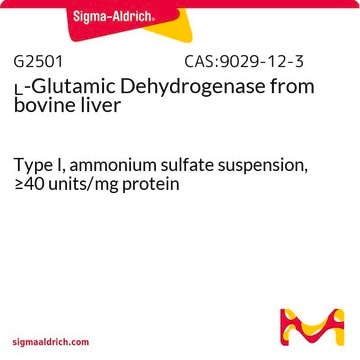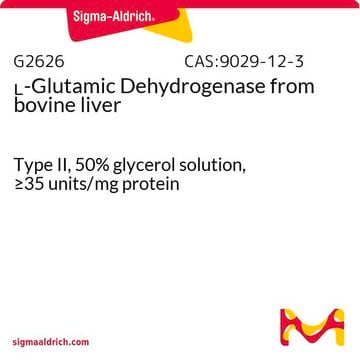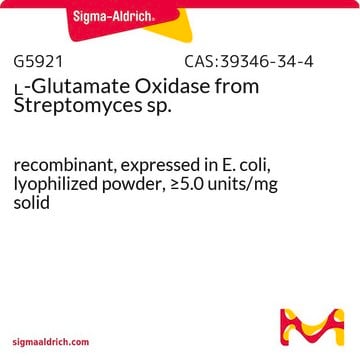G4387
L-Glutamic Dehydrogenase (NADP) from Proteus sp.
buffered aqueous solution, ≥4,000 units/mL
Sinonimo/i:
L-Glutamate:NADP+ oxidoreductase (deaminating)
Autenticatiper visualizzare i prezzi riservati alla tua organizzazione & contrattuali
About This Item
Numero CAS:
Numero MDL:
Codice UNSPSC:
12352204
NACRES:
NA.54
Prodotti consigliati
Origine biologica
bacterial (Proteus spp.)
Forma fisica
buffered aqueous solution
Attività specifica
≥4,000 units/mL
PM
~300 kDa
Temperatura di conservazione
2-8°C
Applicazioni
This enzyme is useful for enzymatic determination of NH3, α-ketoglutaric acid and L-glutamic acid, and for assay of leucine aminopeptidase and urease. This enzyme is also used for enzymatic determination of urea when coupled with urease (URH-201) in clinical analysis. In vitro, various activity assays of this enzyme examine the conversion of α-ketoglutarate to L-glutamate, in the presence of excess ammonium ions (NH4+) and NADPH.
Azioni biochim/fisiol
L-glutamic dehydrogenase catalyzes the conversion of glutamate to α-ketoglutarate.
Proprietà fisiche
Isoelectric point : 4.6
Michaelis constants : 1.1 X 10-3M (NH3), 3.4 X 10-4M (α-Ketoglutarate)
1.2 X 10-3M (L-Glutamate), 1.4 X 10-5M (NADPH), 1.5 X 10-5M (NADP+)
Structure : 6 subunits (M.W.50,000) per mol of enzyme
Inhibitors : Hg++, Cd++, p-chloromercuribenzoate, pyridine, 4-4′-dithiopyridine,
2,2′-dithiopyridine
Optimum pH : 8.5 (α-KG→L-Glu) 9.8 (L-Glu→α-KG)
Optimum temperature : 45oC(α-KG−L-Glu) 45-55oC (L-Glu→α-KG)
pH stability : pH 6.0 - 8.5 (25oC, 20hr)
Thermal stability : below 50oC (pH 7.4, 10min)
Michaelis constants : 1.1 X 10-3M (NH3), 3.4 X 10-4M (α-Ketoglutarate)
1.2 X 10-3M (L-Glutamate), 1.4 X 10-5M (NADPH), 1.5 X 10-5M (NADP+)
Structure : 6 subunits (M.W.50,000) per mol of enzyme
Inhibitors : Hg++, Cd++, p-chloromercuribenzoate, pyridine, 4-4′-dithiopyridine,
2,2′-dithiopyridine
Optimum pH : 8.5 (α-KG→L-Glu) 9.8 (L-Glu→α-KG)
Optimum temperature : 45oC(α-KG−L-Glu) 45-55oC (L-Glu→α-KG)
pH stability : pH 6.0 - 8.5 (25oC, 20hr)
Thermal stability : below 50oC (pH 7.4, 10min)
Definizione di unità
One unit will reduce 1.0 μmole of α-ketoglutarate to L-glutamate per min at pH 8.3 at 30 °C in the presence of ammonium ions and NADPH.
Stato fisico
Solution in 50 mM Tris HCl, pH 7.8, 5 mM Na2EDTA containing 0.05% sodium azide
Altre note
Note: Do not confuse with non-specific L-GLDH, EC 1.4.1.3.
Codice della classe di stoccaggio
10 - Combustible liquids
Classe di pericolosità dell'acqua (WGK)
WGK 3
Punto d’infiammabilità (°F)
Not applicable
Punto d’infiammabilità (°C)
Not applicable
Certificati d'analisi (COA)
Cerca il Certificati d'analisi (COA) digitando il numero di lotto/batch corrispondente. I numeri di lotto o di batch sono stampati sull'etichetta dei prodotti dopo la parola ‘Lotto’ o ‘Batch’.
Possiedi già questo prodotto?
I documenti relativi ai prodotti acquistati recentemente sono disponibili nell’Archivio dei documenti.
I clienti hanno visto anche
J Bailey et al.
The Journal of biological chemistry, 257(10), 5579-5583 (1982-05-25)
The activity of bovine liver glutamate dehydrogenase is affected in several ways depending on substrate concentrations and pH. At ph 6.5 and below, both oxidative deamination and reductive amination reactions are inhibited by ADP. At pH 7.0 and above both
D P Hornby et al.
The Biochemical journal, 223(1), 161-168 (1984-10-01)
In steady-state kinetic studies of ox liver glutamate dehydrogenase in 0.11 M-potassium phosphate buffer, pH7, at 25 degrees C, the concentration of ADP was varied from 0.5 to 1000 microM. Inhibition was observed except when the concentrations of both glutamate
Daria V Borsakova et al.
Scientific reports, 12(1), 5437-5437 (2022-04-02)
Excessive ammonium blood concentration causes many serious neurological complications. The medications currently used are not very effective. To remove ammonium from the blood, erythrocyte-bioreactors containing enzymes that processing ammonium have been proposed. The most promising bioreactor contained co-encapsulated glutamate dehydrogenase
Jette Thykaer et al.
Journal of biotechnology, 139(4), 280-282 (2009-01-27)
New morphological aspects of Penicillium chrysogenum were found during physiological characterisation of two NADPH-dependent glutamate dehydrogenase mutant strains. A morphological characterisation of the previously constructed strains, together with the two beta-lactam producing industrial recipient strains, was conducted. The reference strains
S Cossy Isasi et al.
Experimental parasitology, 122(3), 218-225 (2009-04-09)
Biochemical and structural modifications were investigated in axenic cultured Trypanosoma cruzi after treatment with gangliosides. Fluorescence anisotropy showed dose dependent increments in parasite membranes of ganglioside treated epimastigotes. NADP-GDH activity increased in parasites treated at day 4 (13%), 7 (137.2%)
Il team dei nostri ricercatori vanta grande esperienza in tutte le aree della ricerca quali Life Science, scienza dei materiali, sintesi chimica, cromatografia, discipline analitiche, ecc..
Contatta l'Assistenza Tecnica.








